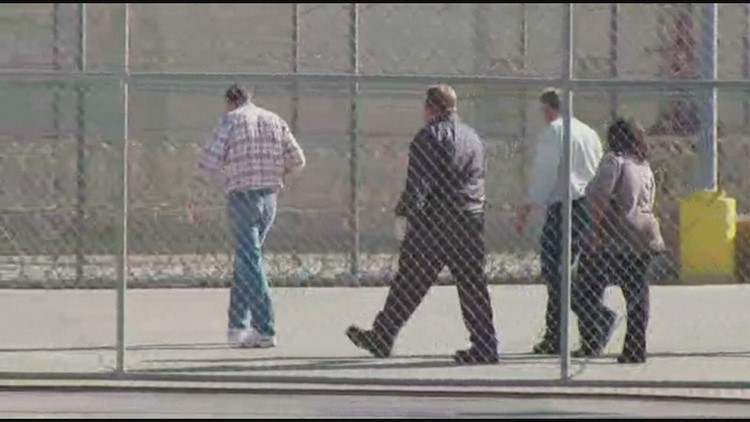BURNS, Ore. -- An Oregon ranching duo convicted of arson charges clashed with the Bureau of Land Management for more than a decade before sparking the movement that ended with dozens of anti-government demonstrators seizing a wildlife refuge in rural Harney County, according to court documents.
Dwight Hammond Jr., 73, and his son Steven Hammond, 46, turned themselves in at a California federal prison facility Monday, months after a ninth circuit court judge ruled sentences previously handed down by a lower court were illegal.
The appeals court decision spurred backlash in eastern Oregon from those who believed the Hammonds were being unfairly treated. The reaction reached a peak when a faction of supporters broke off from a larger protest in Burns, Ore. and headed to the Malheur National Wildlife Refuge about 30 miles southeast of town.
The group's demands range from the Hammonds' release from prison to the government relinquishing control and abolishing regulations on public lands.
According to an indictment filed June 17, 2010, the BLM issued the Hammonds a rangeland grazing permit in 2004, which allowed the ranch's cattle to graze on public land in addition to the private land owned by Hammond Ranches.
Prosecutors alleged in the indictment the Hammond family set fire to the rangeland after complaining the BLM was taking too long to complete required environmental studies before conducting controlled burn operations.
![Acting U.S. Attorney Billy J. Williams [ID=78385204] [ID=78385204]](/Portals/_default/Skins/PrestoLegacy/CommonCss/images/pullquote.jpg) "The Hammonds also have ignited uncontrolled fires under cover of naturally occuring dry lightning storms which occur on the western slopes of the Steens Mountain in late summers," then-United States Attorney Dwight C. Holton wrote in the indictment. "For more than twenty years, Hammond family members have been responsible for multiple fires in the Steens Mountain area."
"The Hammonds also have ignited uncontrolled fires under cover of naturally occuring dry lightning storms which occur on the western slopes of the Steens Mountain in late summers," then-United States Attorney Dwight C. Holton wrote in the indictment. "For more than twenty years, Hammond family members have been responsible for multiple fires in the Steens Mountain area."
A jury convicted the pair of starting the 2001 Hardie-Hammond Fire that burned 139 acres of BLM land. Steven Hammond was also convicted of intentionally starting the 2006 Lower Bridge Creek Fire. Despite the five-year mandatory minimum for a federal arson conviction, Judge Michael Hogan sentenced the elder Hammond to three months behind bars and his son to a year and a day.
But after prosecutors appealed the decision, both men were resentenced in October to the five-year mandatory minimum. They were allowed to self-surrender after the holidays.
Acting United States Attorney Billy J. Williams wrote in a Dec. 7 op-ed in the Burns Times Herald that the Hammonds' backers did not have the whole story.
"I understand that there are some individuals and organizations who object to the Hammonds returning to prison to serve the remainder of their sentences mandated by statute," he wrote. "I respect their right to peacefully disagree with the prison terms imposed. However, any criminal behavior contemplated by those who may object to the court's mandate that harms someone will not be tolerated and will result in serious consequences."
Supporters of the two men maintain the Hammonds started fires to destroy invasive species and protect their property by removing wildfire fuels, and that flames spread to public lands inadvertently.
But witnesses in the trial told a different story. The jury heard from three witnesses who were hunting in 2001 when they saw the Hammonds shoot over their heads to illegally slaughter a herd of deer, according to court documents. A short time later, the hunters testified, they had to abandon their camp because of a fire burning in the area.
A teenage relative of the Hammonds also testified during the trial that Steven Hammond gave him a box of matches and told him to drop lit matches on the ground to "light up the whole county on fire," Williams wrote.
Williams says photographs and testimony from the hunting guide proved the fires were set hours before Steven Hammond called the BLM to report he was about to conduct a burn of invasive species in the area.
The U.S. Attorney dismissed arguments that the Hammonds were accused of terrorism.
"The evidence at trial convinced the jury beyond a reasonable doubt that the Hammonds were guilty of the federal crime of arson; that is, maliciously damaging United States property by fire," he wrote. "The jury was neither asked if the Hammonds were terrorists, nor were defendants ever charged with or accused of terrorism. Suggesting otherwise is simply flat-out wrong."
The second arson in 2006 came as firefighting crews were battling lightning-started wildfires on BLM land. A burn ban and red flag warning was in effect in the area at the time.
"Despite the burn ban, and knowing that firefighters were in the area, Steven Hammond set fires at night without notifying anyone," Williams wrote. "He did so to save his winter feed. After seeing the fires, the firefighters moved to a safer location."
When confronted by a firefighter the following day, Hammond admitted to starting the fire, Williams wrote.
![Ammon Bundy, Citizens for Constitutional Freedom [ID=78385232] [ID=78385232]](/Portals/_default/Skins/PrestoLegacy/CommonCss/images/pullquote.jpg) Williams argues the Hammonds' sentences follow the law and are not excessive, considering the danger in which the Hammonds' actions placed the hunters and the firefighters. He also suggested that much of the outcry after the resentencing came from those who have not bothered to follow the case.
Williams argues the Hammonds' sentences follow the law and are not excessive, considering the danger in which the Hammonds' actions placed the hunters and the firefighters. He also suggested that much of the outcry after the resentencing came from those who have not bothered to follow the case.
"Much has been said and written by persons who were not in the Pendleton courtroom during the trial or in Eugene during the sentencing hearings," he wrote. "Much of it is inaccurate."
But Ammon Bundy, the leader of the militia group that has seized the wildlife refuge, said Wednesday that he had uncovered new evidence he believes will exonerate the father and son.
"We have evidence of eyewitnesses that saw the Bureau of Land Management - an agent, two agents from the Bureau of Land Management - that actually lit the fire with a drip torch on the south and the north side of the Hammonds' Steen Mountain property," he said.
Bundy said the Hammonds started a back burn after the fire closed in on their winter range.
"This is something that as far as we're aware of has never been acknowledged or reviewed in the court," he said. "We feel that it is strong enough evidence that, going through the proper measures, we will be able to get the Hammonds released."
If the group is successful in getting the ranchers exonerated, Bundy said, he believes the takeover of the Malheur National Wildlife Refuge will have been worth it.
The occupiers have previously said the Hammond family was targeted as part of a plot by federal agencies to steal their ranch.
"Those agencies has desired for many years to acquire their ranch, and the Hammond family have refused to sell it because they want to pass on the ranching heritage to their children and to their grandchildren," Bundy said in a Monday news conference. "Because of that refusal to sell their ranch, those agencies began an attack on this family."
He described the Hammonds' legal case as a tipping point in the fight against government overreach.
"There comes a time when people are ignored to the point they're frustrated, they don't know what else to do - they see an injustice but all level of government are ignoring it," Bundy said. "And the prudent methods are basically not allowed to the people. That is when the people have a right to take a hard stand, and that is what we did."



